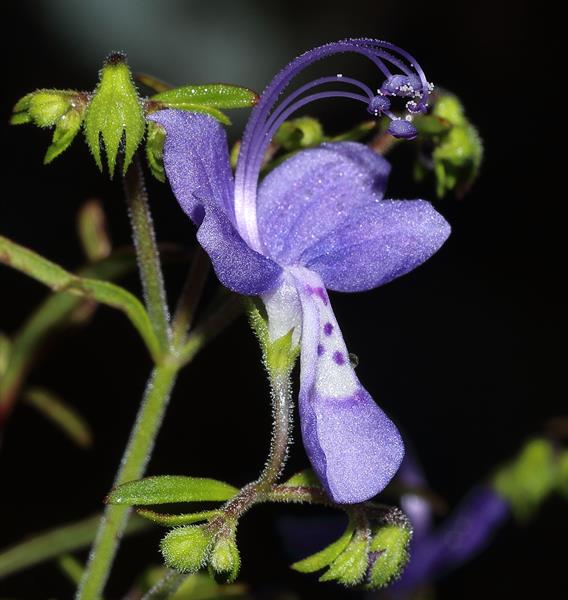
Contributed by R. Kevan Schoonover McClelland
A genus of about 25 species, short-lived shrubs and annual and perennial herbs, of temperate North America (especially diverse in w. North America, with a second center of diversity in se. North America, primarily FL). The genus is divided into six sections, quite disparate in morphology and chromosome number, of which one (section Trichostema) is endemic to eastern North America (and centered in the Southeast), four are endemic to western North America (BC to Mexico, and especially California), and one (section Isanthus) is mainly eastern, but disjunct in w. NE and AZ (McClelland & Weakley 2023).
Ref: Harley et al. In Kadereit (2004); Lewis (1945); McClelland & Weakley (2019) In Weakley et al. (2019a); McClelland & Weakley (2023) In Weakley et al. (2023); McClelland, Weakley, & Poindexter (2023). Show full citations.
Hover over a shape, letter, icon, or arrow on the map for definition or see the legend. Data for arrows not developed for genera and families which may have species only occurring outside the flora area.
 © Scott Ward | Trichostema setaceum | Original Image ⭷
© Scott Ward | Trichostema setaceum | Original Image ⭷ © Richard & Teresa Ware | Trichostema coeruleum CC-BY-NC, permission granted to NCBG | Original Image ⭷
© Richard & Teresa Ware | Trichostema coeruleum CC-BY-NC, permission granted to NCBG | Original Image ⭷ © Scott Ward | Trichostema suffrutescens | Original Image ⭷
© Scott Ward | Trichostema suffrutescens | Original Image ⭷ © Floyd A. Griffith | Trichostema setaceum | Original Image ⭷
© Floyd A. Griffith | Trichostema setaceum | Original Image ⭷ © Gary P. Fleming | Trichostema coeruleum | Original Image ⭷
© Gary P. Fleming | Trichostema coeruleum | Original Image ⭷Feedback
See something wrong or missing on about Trichostema? Let us know here: (Please include your name and email if at all complicated so we can clarify if needed.)
Cite as...